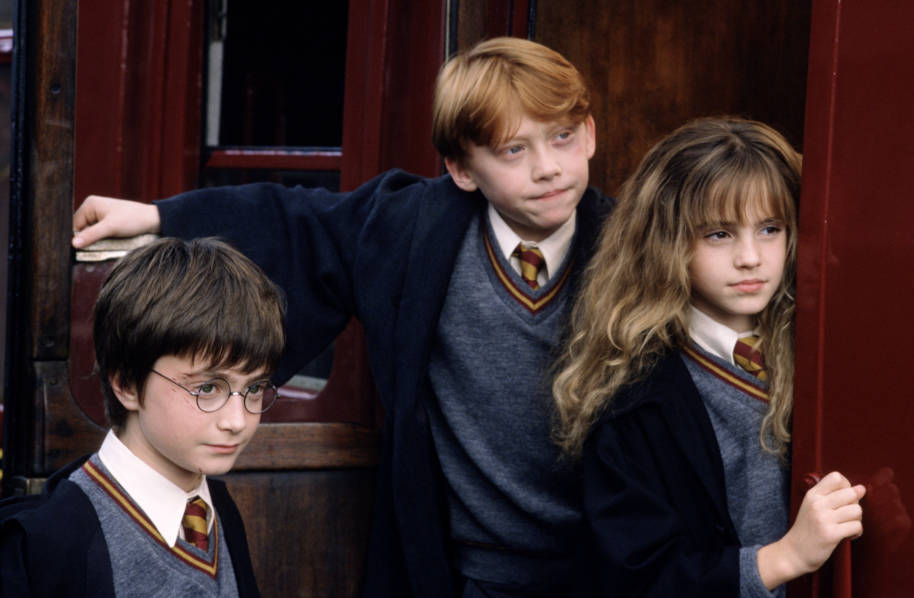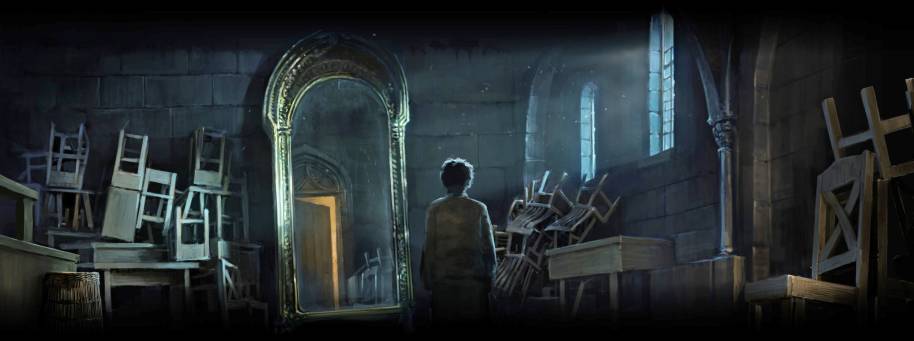
The vanishing glass
Although we hear about some of Harry’s unwitting moments of magic – like his hair growing back after every barber visit or him ending up on the roof of the school kitchens – the moment he frees the boa constrictor at the zoo is the first time we witness what he can really do.
Without thinking, Harry engages in a casual conversation with the talkative snake, and suddenly the glass vanishes. Cue a grateful boa constrictor and very embarrassed keeper of the reptile house probably terrified of keeping his job. But while Harry is simply mercilessly punished by the Dursleys, he has no idea how truly important this moment is. Not only is it another example of his magical abilities, it’s the first evidence we have of Harry’s affinity with snakes, the trait he shares with Voldemort. Thanksss, amigo.

Entering Gringotts
The first time Harry steps foot in Gringotts he assimilates a lot of information in a short space of time: what a goblin looks like, how wizarding money works, and the realisation that he owns a small fortune in a currency he hadn’t even known existed.
He also meets Griphook, the goblin who shows him to his vault for the first time and will become very important later on. Who could guess, at that point, that Griphook would be so key to Harry’s Horcrux journey?
Meeting Malfoy
It’s not just Gringotts – Harry’s initial foray into the wizarding world means a lot of firsts: meeting Hagrid, learning about magic, seeing his first broomstick, discovering Diagon Alley. Another that particularly stands out is his meeting with the boy we later learn is Draco Malfoy.
Standing in Madam Malkin’s, being fitted for robes together, talking about school – Harry might have leapt at the chance to meet another wizard his age, but from the outset, his response to Malfoy is suspicion. He’s not impressed by Malfoy’s superiority or his condescending attitude to Hagrid, a man Harry has only just met but one to whom he is immediately loyal. This says a lot about Harry’s character, and by not shaking Malfoy’s hand, Harry has already made a huge choice in his Hogwarts future.

Meeting Ron
Harry’s first meeting with Ron couldn’t be more different. In fact, Harry seems to naturally gravitate towards the Weasleys, asking Ron’s kindly mum for help at platform nine and three-quarters, and then meeting his future best friend. When he and Ron sit together on the Hogwarts Express, he’s as fascinated by Ron’s family as Ron is by Harry Potter. The messy warmth of the Weasleys and their immersion in the wizarding world is fascinating to Harry.
This is also a moment that changes Ron’s life. From the first, he gives a sense of being second-best, and that’s not something that goes away when you’re friends with Harry Potter. This feeling grows quietly, and although it never causes any lasting damage there are danger signs, notably Ron’s jealousy in Goblet of Fire and his desertion of Harry and Hermione in Deathly Hallows. We see that glimmer early on, when Harry buys the entire sweets trolley, and Ron looks in shame at his corned beef sandwiches.

First impressions of Snape
Oh, how little we knew.
The first time Harry sees Snape, he feels a ‘sharp, hot pain’ shoot across his scar. This is a reaction he (and we) later come to associate with Voldemort, so perhaps it’s not surprising that Harry takes an instant dislike to Snape.
The situation is not helped by Snape, of course. Not knowing Snape’s history with his parents, by the end of his first Potions lesson Harry knows only that Snape hates him. The feeling becomes mutual. Snape seems determined to bring Harry down, influenced – we later learn – by how much Harry resembles his father. There’s no obvious indication about how Snape remembers Harry’s mother at this point, but it’s really not surprising that Harry sees Snape as the antagonist in his first year.
Making friends with Hermione
So Harry and Ron don’t get off on the best footing with Hermione, but once again, this is a good lesson on not judging a book by its cover. Especially a bookworm like Hermione. She’s bossy, overconfident and a know-it-all, and she doesn’t do herself any favours when she lectures Ron on the correct pronunciation of ‘Wingardium Leviosa’. (It’s Levi-o-sa, actually.)
But when Hermione shows her softer side after that disastrous Charms lesson, they realise her heart is in the right place. What better way to build bridges then rescue her from a whopping great troll? Hermione does her part too, blaming herself for being in the troll’s path in the first place and absolving Ron and Harry of any punishment.
As a blueprint for their relationship as a trio, it’s pretty telling. Each of them is brave and slightly reckless, but they all work together in the end.

The Mirror of Erised
Harry’s reaction to seeing his parents and wider family reflected in the Mirror of Erised shows us how deeply he wants a family. Ron, who wants to be centre-stage after a lifetime of second-best, sees himself standing alone. Both of these desires are completely understandable, and neither Harry or Ron make any attempt to hide them.
Dumbledore, on the other hand, reveals nothing. His personal secrets remain hidden. At that moment we didn’t know how much he was concealing, or how important it would become to Harry, but when Dumbledore speaks to Harry directly for the first time after finding him with the Mirror of Erised, he reveals himself to be wise, kind, aloof and furtive, all at the same time. Soon, we’d find out that it wasn’t very likely Dumbledore would want thick, woollen socks that much.

Neville’s bravery
Neville’s nerves set him apart from many of his fellow students. He’s anxious, forgetful and lacking in confidence. In short, he’s an easy target for Malfoy’s bullying.
But when it comes down to it, Neville’s nerves are actually made of steel. He takes Ron’s advice and stands up to Malfoy, even though he’s stuttering. And he doesn’t stop there. When he catches Harry, Ron and Hermione out of bed, he tries to stop them, forcing Hermione to perform a Body-Bind Curse on him and earning the ten points for bravery that win Gryffindor the House Cup.
Later, when Neville takes a leading role in the resistance at Hogwarts during Deathly Hallows, this moment takes on added significance. It shows us that Neville was always brave, it was only confidence he lacked.
Dumbledore’s evasion
When Harry asks Dumbledore the question we all wanted to know – why did Voldemort want to kill him in the first place? – Dumbledore doesn’t answer.
Much later, in Order of the Phoenix, he admits to Harry that the reason for this is because he cares more about Harry’s happiness than about being honest.

Would knowing everything from the start have helped Harry in his subsequent fight against Voldemort? Who knows. But it’s a defining moment for Dumbledore as much as it is for Harry. Harry trusts his elusive headmaster and doesn’t think to question his answer. Dumbledore, on the other hand, begins to realise the flaw in his plan, as he says in Order of the Phoenix: ‘I had fallen into the trap I had foreseen, that I had told myself I could avoid, that I must avoid.’
When it comes down to it, so much of Harry’s life traces back to his first year at Hogwarts.


